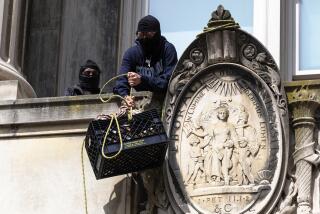Castro Rejects Soviet-Style Reform in Cuba
President Fidel Castro on Tuesday night firmly said no to pursuing the economic and political changes taking place in the Soviet Union. He also committed Cuban military forces to a “gradual and total” withdrawal from Angola.
Castro’s three-hour speech before more than 100,000 people bluntly rejected the Soviet policies of glasnost (political openness) and perestroika (restructuring), which he said are inappropriate for Cuba’s 29-year-old revolution.
The Cuban leader showed contempt for changes that have been applied in the Soviet Union that give freer rein to market forces and said that those who urge adoption of those programs in Cuba have “an incorrect attitude, an ignorant attitude.”
“We will never forget where we are located, and it isn’t in the Black Sea, but in the Caribbean Sea,” the 61-year-old revolutionary leader said. “Not 90 miles from Odessa, but 90 miles from Miami.”
Castro’s comments on Angola were his first on the situation in that African country since an agreement in principle to end the 13-year war there was reached July 13 in New York among South Africa, Cuba and Angola, with mediation by the United States.
Castro said productive negotiations toward a settlement became possible after Cuba sent thousands of reinforcements there early this year and pushed South Africa’s forces back from positions in southern Angola.
“Our objective was not a military victory but a political, just solution to the conflict,” he said.
Cuba says it has at least 40,000 troops in Angola. Other reports put the total at 50,000.
Gradual, Total Withdrawal
“If the (Angola) agreement is completed and respected, Angola and Cuba will carry out a gradual and total withdrawal of all the internationalist contingent in Angola,” Castro said. “There is a real possibility of a just and honorable solution to the war.”
But he added that his troops’ return home “can’t be abrupt.” He said “a minimum of time” would be required for Angolan troops to take over positions now defended by Cubans.
Castro spoke on the 35th anniversary of his failed assault on the Moncada Barracks in this steamy city of 900,000 on Cuba’s southeastern tip.
That battle is now considered the opening volley in a struggle that culminated in the 1959 revolution that ended the rule of Fulgencio Batista.
In addressing the subject of reform, Castro said Cuba maintains “excellent communications” with the leaders of the Soviet Communist Party. But without mentioning either glasnost or perestroika, he said, “If you are suffering from a toothache, why look for a corn plaster? If you have corns, why get a remedy for a toothache?”
Cuba tried a farmers’ market experiment in the early ‘80s, but Castro abruptly halted it in 1986.
“We have to guard the ideological purity of our revolution. We can’t use any method that smells of capitalism,” Castro said.
In another passage, Castro said, “No two revolutions are alike . . . we will always be reluctant to copy slavishly prescriptions for someone else’s problems that we never had.”
Noting that Japan achieved its status as one of the world’s most powerful nations economically with an average of six vacation days per worker each year, Castro called on Cubans to achieve more during the working hours they have. He said he wasn’t suggesting taking away vacations or increasing work schedules in Cuba.
Two years ago, Castro declared that worker absenteeism and inefficient production threatened to make Cuba a nation of freeloaders.
He said that Cubans must concentrate on fortifying their one-party Communist rule and improving their socialist central planning in order to strengthen their revolution.
More to Read
Start your day right
Sign up for Essential California for news, features and recommendations from the L.A. Times and beyond in your inbox six days a week.
You may occasionally receive promotional content from the Los Angeles Times.






